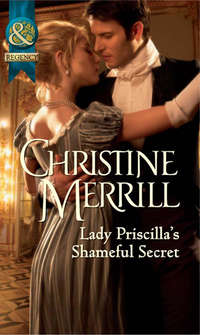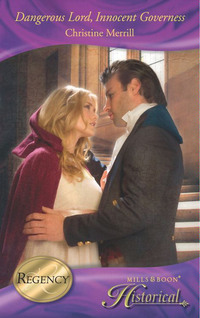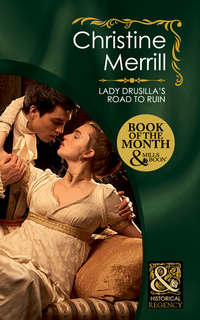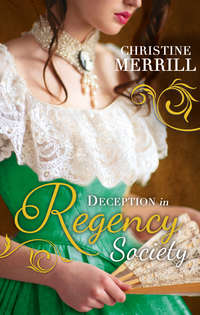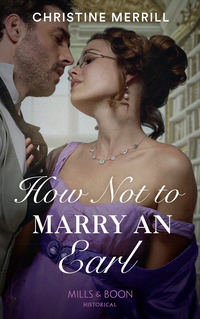
Полная версия
One Snowy Regency Christmas: A Regency Christmas Carol / Snowbound with the Notorious Rake


It may be cold outside, but it’s heating up inside these Regency manors!
It is going to be a very improper Regency Christmas!
One Snowy
REGENCY
Christmas
Two gorgeous, glittering and seasonal Regency romances from favourite authors Christine Merrill and Sarah Mallory
One Snowy Regency Christmas
A Regency Christmas Carol
Christine Merrill
Snowbound with the Notorious Rake
Sarah Mallory

www.millsandboon.co.uk
A Regency Christmas Carol
Christine Merrill
Dear Reader,
It is always a challenge to write Christmas stories in the Regency. It’s a historical period where the holiday is defined as much by what they didn’t have as what they did. Many of the trappings we consider traditional are actually Victorian. Without carols, cards, trees and Santa, a Regency Christmas looks more like a big house party. And that can end up looking like any other Regency house party, but with the addition of bad weather.
When I began studying the problems in the North during 1811, the task became even harder. The workers were in revolt. At one point there were more British troops there than there were fighting Napoleon. Mill owners were hamstrung by embargoes that kept them from selling their cloth to countries allied with France. That included America, which had been a major source of income. There was an anti-war sentiment that is rarely mentioned in our largely patriotic stories.
The problems I was finding as I researched resonate today as much as they did then. There was a desperate need for compassion and understanding between labour and management.
And that thought led me to a story which was completely out of period, but the best primer anyone can hope for on the reflection, redemption, and charity that can be found at the heart of the Christmas season.
I hope you enjoy it.
Christine Merrill
About the Author
CHRISTINE MERRILL lives on a farm in Wisconsin, USA, with her husband, two sons, and too many pets—all of whom would like her to get off the computer so they can check their e-mail. She has worked by turns in theatre costuming, where she was paid to play with period ballgowns, and as a librarian, where she spent the day surrounded by books. Writing historical romance combines her love of good stories and fancy dress with her ability to stare out of the window and make stuff up.
Look for more great novels from Christine Merrill in Mills & Boon’s Historical romances.
With thanks and apologies to Charles Dickens.
And a question. Why did the spirits do it “all in one night”
when Marley is so specific about needing three?
That’s always confused me.
CHAPTER ONE
December 1811
BARBARA Lampett ran down the lane at the edge of the village of Fiddleton, feeling the crunch of icy mud beneath her feet and the stitch in her side from the cold air in her lungs. Lately it seemed that she was always running after something or other. She wondered if the lack of decorum on her part was the first sign of a life spun out of control.
It was really no fault of her own. Had she the choice, she’d have been in a seat by the parlour fire, staring out at the changing weather and pitying those forced to go about in it. But Father paid little heed to his own discomfort when he was in one of his moods, much less that of others.
And she could hardly expect her mother to go. Mother’s volatile nature would add warmth to the day, but it would do nothing to cool her father’s zeal. Nor was Mother young and strong enough to face the crowd that surrounded him when he spoke, or to extricate him from the hubbub he created.
The new mill lay almost two miles from the centre of the village. It was too short a distance to harness a carriage, but longer than a pleasant walk—especially on such a chill December day as this. Barbara found some consolation that the ground was frozen. She had decided to forgo pattens in favour of speed, but she did not wish to ruin the soft boots she wore by walking through mud.
And much mud there would have been if not for the cold. Ground that had once been green and lush was now worn down to the soil, with the comings and goings of wagons and goods, and the tramp of growing mobs that came to protest at the gates of the new buildings of Mr Joseph Stratford.
A crowd gathered here now. Another of the demonstrations that had been occurring almost daily thanks to her father’s speeches. Mixed amongst the angry weavers were the curious townsfolk. They did not seem to care either way for the plight of the workers, but they enjoyed a good row and came to the gatherings as a form of entertainment.
There was a sudden blast of wind and she wrapped her shawl more tightly about her, unable to fight the feeling of dread that came with the exhilaration. While it pleased her to see the people attracted to her father’s words, the path he was leading them down was a dangerous one and his actions dangerously unwise. With each passing day he seemed to grow more reckless, speaking from the heart and not the head. He could not seem to understand what his comments would do to the local populous.
But she could feel them, caught in the crowd as she was, buffeted by the bodies of angry and fearful men. There was a growing energy in the mob. Some day a chance word or a particularly virulent speech would push them too far. Then they would boil over into real violence.
When the wind blew from the east you could still smell the burned-out wreckage of the old mill, where so many of these men had been employed. That owner had paid dearly for his plans at renovation, seeing his livelihood destroyed and his family threatened until he had given up and quit the area. That had left the protestors with no work at all, and even angrier than they had been before.
It seemed the new master would be cagier. When he’d built his new mill, like the pig in the old story, he had used bricks. It loomed before her, a blight on the horizon. Every element was an insult to the community and proof that the person who had built it lacked sensitivity for his neighbours. It was large and squat and altogether too new. He had not built in the wreckage of Mackay’s Mill, which might have given the people hope of a return to normality. Instead he’d placed it closer to the grand old house where he currently lived. It was not exactly in the front park of the manor, but plainly on the estate, and in a place by the river that the Clairemonts had allowed all in the village to use as common greensward when they’d lived there. It was obvious that Mr Stratford had thought of nothing but his own convenience in choosing this site.
Though he showed no signs of recognising the impropriety of the location, he’d built a fence around a place that had once been the home of picnics and fêtes, trampling the freshness to hard-packed mud. Barbara was convinced it demonstrated on some deep and silent level that the master of it knew he was in the wrong and expected to receive trouble for it. The wrought-iron border surrounding the yard separated it from the people most likely to be angry: the ones whose jobs had been taken by the new mechanised looms.
She pushed her way through the crowd to the place where her father stood at the foot of the stone gatepost, rallying the men to action. Though recent misfortune had addled his wits, it had done nothing to dull the fire in his eye or the clarity in his voice. While his sentiments might be unwise, there was nothing incoherent in the nature of his words.
‘The Orders in Council have already depressed your trade to the point where there is no living to be made by an honest man—no way to sell your cloth to America and other friends of France.’
‘Aye!’
There were shouts and mutters, and the brandishing of torches and axe handles in the crowd. Barbara’s heart gave an uneasy skip at the thought of what might happen should any man think to bring a firearm into the already volatile situation. She was sure that the mill owner towards whom the ire was directed sat in the closed black carriage just behind the gates. From there he could listen to every word. Perhaps he was even noting the name of the speaker and any others preparing to act against him.
But her father cared nothing for it, and went on with his speech. ‘The new looms mean less work for those of you left and more jobs falling to inexperienced girls, while their fathers and brothers sit idle, dreaming of days past when a respectable trade could be plied in this country.’
The mutterings in answer were louder now, and punctuated with shouts and a forward surge of bodies, making the gates rattle in response to the weight of the crowd.
‘Will you allow the change that will take the bread from your children’s mouths? Or will you stand?’
She waved her arms furiously at her father, trying to stall what was likely to occur. The government had been willing to use troops to put down such small rebellions, treating their own people as they would Boney’s army. If her father incited the men to frame-breaking and violence they would be answered with violence in return. Mr Stratford might be as bad as her father claimed, but he was not the timid man Mackay had been. He would meet strife with strife, and send for a battalion to shoot the organisers.
‘Father!’ she shouted, trying to catch his attention. But the workers towered around her, and her voice was swallowed up by the din. Before she could speak a calming word the first shot rang out—not from the crowd, but from the door of the carriage in front of them. Even though it was fired into the air, the mob drew back a pace like a great animal, startled and cringing. Barbara was carried along with it, relieved all were safe and yet further from her goal.
The carriage door opened and Stratford appeared, leaping to the ground before his worried footman could help him and springing to the same stone post where her father stood. He climbed easily up the back of it until he stood at the top and towered over her father and the other men. He held what looked like a duelling pistol in his right hand. With his left he drew back his coat, so the crowd could see its mate was tucked into his belt. He looked like a corsair—nimble, fearless and ready for battle. Barbara could easily imagine him with a blade between his teeth, rushing the crowd.
She was just as sure that he would be the sort to take no prisoners. Though he was a handsome man, in a dark and hungry sort of way, there was nothing in his sharp features that bespoke a merciful nature. His grey eyes were hard and observant. His mouth, which might be capable of a sensual smile, was twisted in a sneer. Her father thought him the very devil, set upon the ruin of all around them.
But if devil he was then he was a handsome devil as well. Although she could think of a hundred reasons she should not notice it, she thought him a most attractive man. She schooled herself not to stare up with admiration, as she had caught herself doing on those few times she’d seen him in the village.
Perhaps she should have found him less impressive, for that sneer on his face quite spoiled the evenness of his features. While she had thought the position he took on the wall made him look taller than average, he hardly needed the advantage. He stood well over six feet. Today he was a fearsome thing, and nothing for a young lady to gawk at.
To match his physical presence he had the sort of forceful personality that seemed to incite strong emotion in friends as well as enemies. And, frightening though he might be, Barbara was sure that once she was focused on him she would not be able to look away.
‘Who will be the first through the fence, then?’ Stratford shouted down at the crowd. ‘I swear to you, that man will lose his life along with his livelihood.’
The workers shrank back another pace, huddling against each other as though seeking warmth in the cold.
The man on the post laughed down at them. ‘I thought as much. All bluff and bluster when there is no risk to you, and cowardice when there is.’
Her father turned, shouting up at him. ‘It is you who are the coward, sir. Vain and proud as well. You hide behind your gates with your idle threats, unwilling to walk among the common man and feel his pain, his hunger, his desperation.’
Stratford glared back at him. ‘I do not have to walk among you to know about you. I can go to the ruins of Mackay’s place—a mill that you destroyed—to see the reason for your poverty. If you could, you would burn my factory as well—before I’ve even managed to open it. And then you’d complain that I’d treated you unjustly. I tell you now, since you have so conveniently gathered here, that I will not listen to your complaints until you begin making sense.’
It was unfair of him to compare this gathering to the burning of Mackay’s place. Most of the men here had taken no part in that, rushing to save their workplace and not destroy it. The matter was much more complicated than Stratford made out. He was too new here to know and unwilling to listen, just as her father had said. Barbara pushed against the men around her, trying to work her way to the front again so that she might be heard.
Just as she thought she might reach her objective a man’s boot caught in the hem of her gown and she started to fall forwards under the crush. She felt a rush of panic as she realised that no one around her was noticing as she fell. They had forgotten their fear of the second gun and were advancing to disprove Stratford’s claims of cowardice.
She called out again, hoping that her father might hear and help her. But his back was to her as he shook a fist to threaten Stratford. He was too preoccupied to notice what was happening. In a moment she would be knocked to her knees. Then she would be dragged under, as though sinking beneath a human wave, and stamped into the mud in the trample of hobnailed boots.
‘Ay-up!’ She felt a sudden change, and the crowd parted around her. A hand caught her by the shoulder and yanked her to her feet with a rip of cloth. There was a shout as loud and ringing as her father’s. But it came from close at her side, easily besting the noise of the crowd. ‘Mind what you are doing, you great oafs. You may say what you like to me, but mind that there is a lady present. Have a care for her, at least. Perhaps I judge you unworthy of employment because you behave no better than animals.’
Then she was back on her feet, and the support was gone from her arm. She felt the crowd swirl around her again as her rescuer retreated. But for a moment there was a subdued quality to the actions of the mob, as though their frenzy had been defused by shame.
And the man who had saved her was back at the front of the group again, pushing past her father and climbing back onto the pillar that held the gate. She had thought Mr Stratford an intimidating figure even while behind the gates. But it was even more startling to have been so close to him, even for a moment. He had used his strength to force others out of the way, and his agility to be down to the ground and back up the fence before the mob had realised that he had been in their grasp. He was staring down at them again, his expression more disgusted than angry, as though they had proved to him that he was correct in his scorn.
‘Go home to your families, if you care so much about them. A new year is coming, and a new age with it. You had best get used to it. When Stratford Mill is open in a month there will be work for those of you willing to put aside this nonsense and tend to your shuttles again. But if you rise against me I will see the lot of you transported and run it with your daughters. They will cost me less and have the sense to keep their tongues.’ He reached towards his belt, and the group before him gasped. He withdrew not a pistol, but a purse, showering the coins into the crowd.
‘A Merry Christmas to you all!’ he shouted, his laugh both triumphant and bitter as he watched the threat dissolve as the crowd scrambled for the money. ‘Do not bother to come here again. As long as I breathe, I will not be stopped. If you destroy the machinery I will get more, until you wear yourselves out with breaking it. Take my money and go back to your homes. I have summoned the constable. If you are here when he arrives you will spend Christmas Day in a cell, longing for your families. Now, be off.’
It shamed her to watch the men of the village too on the ground to notice this new threat. They were a proud bunch. In better times they would have thrown the coins back in the face of this stranger rather than accept his charity and his scorn. But the recent economic troubles had left most of the village without work and in need of any money they might find to make any kind of a Christmas—merry or otherwise—for their families.
Her father’s rallying cries were lost in the scuffle as men scrabbled in the dirt for pennies. Barbara pushed through them easily this time, until she could lay her hand upon her father’s arm. ‘Come away,’ she whispered. ‘Now. Before this goes any further. You can speak another day.’
It seemed the mood had left him, passing out of his body like a possessing spirit, leaving him quiet and somewhat puzzled, as though he did not quite know how he had come to be standing here in front of so many people. He would come away with little struggle, and she would have him home before the law arrived. All would be well. Until the next time.
Directly above her, and removed from the chaos, Joseph Stratford observed—distant and passionless, as though he did not know or care for the pain he was causing. When she looked at him all her father’s anger and frustration seemed to rush into her. If the Lord had bothered to imbue her with reason, then why could he have not made her a man, so that other men might listen to her?
She turned and shouted up at the dark man who thought himself so superior to his fellows. ‘You blame the men around me. But you should be ashamed of yourself as well. You stand over us, thinking yourself a god. You are mocking a level of hardship that you cannot possibly understand. You act as if you are made of the same rough wood and cold metal gears that fill your factory. If I could see the contents of your heart it would be nothing but clockwork, and fuelled by the coal running in your veins.’
Just for a moment she thought she saw a change in his face, a slight widening of the eyes as though her words had struck home. And then he gave a mirthless, soundless laugh, little more than a lifting and dropping of the shoulders. ‘And a Merry Christmas to you as well, my dear.’ Then he turned and stepped easily from his perch, dropping to the ground, though it must have been nearly eight feet, and strolling back to his carriage and his nervous grooms and coachman. They came cautiously forwards to open the gates so that the carriage could get through. They needn’t have worried, for the men who had blocked the way had turned for home in embarrassed silence as soon as the money on the ground had been collected.
She pulled her father to the side of the road so that the horses could pass. But there was the signalling tap of a cane against the side of the box as the vehicle drew abreast of them, and the driver brought it to a stop so that Stratford could lean out of the window and look at them.
‘This is not the end of it, Stratford,’ her father said in a quieter voice. Now that the crowd was gone he sounded capable of lucid argument, and quite his old self.
‘I did not think it was, Lampett,’ Stratford replied, smiling coldly down at her father, staring into his eyes like a fighter measuring the reach of his opponent before striking.
‘I will not let you treat these people—my people—like so many strings on your loom. They are men, not goods. They should be respected as such.’
‘When they behave like men I will give them respect. And not before. Now, go. You have lost your audience, and your child is shivering in the cold.’
I am not a child. She was full four and twenty. Not that it mattered. But she was shivering—both from fear and the weather. The slight made her stand a little straighter, and fight the shudders until she could appear as collected and unmoved as her enemy was.
It did not seem to bother Joseph Stratford in the least that the weight of the entire town was against him. They had broken his frames once already and sabotaged the building of the mill at every turn. Still he persevered. Barbara wished she could respond in kind with that careless, untouchable indifference.
The envy bothered her. Perhaps—just a little—she appreciated the man’s sense of purpose. However misguided it might be. When she looked at him she had no doubt that he would succeed. While her father was all fire, he flared and burned out quickly. But Stratford was like stone, unchanging and unmoved. It would take more than a flash of anger to move a man like him once he had set himself to a goal.
She looked again at him and reminded herself that he was proud as well. That sin would be his downfall if nothing else was. He could not succeed if he reduced all men to enemies and herself to a faceless, valueless child.
As she watched the two men, locked eye to eye in a silent battle, she was relieved that her father did not own a firearm. Though she thought she could trust Mr Stratford—just barely—not to shoot without provocation, there was no telling what her father might do when his blood was up and his thinking even less clear than usual. She reached out for her father’s arm again, ready to guide him home. ‘Come. Let us go back. There is nothing more that you can do today. If he has truly called for the constable, I do not wish to see you caught up in it.’
He shook off the embrace with a grunt and stepped back, giving an angry shrug as the carriage moved again, travelling up the road to the manor house. ‘It would serve him right if I was arrested. Then the world would see him for the sort of man he is: one who would throw an old man into jail to prove himself in the right.’
There was no point in explaining that the only lesson anyone was likely to see was that Stratford sat in a mansion at a fine dinner, while Lampett sat hungry in a cell. ‘But it would make me most unhappy, Father,’ she said as sweetly as possible. ‘And Mother as well. If we can have nothing else for Christmas, can we not have a few days of peace?’
‘I will be peaceful when there is reason to be,’ her father acceded. ‘I doubt, as long as that man breathes, we will see that state again.’
CHAPTER TWO
JOSEPH Stratford rode home alone in comfortable, if somewhat pensive, silence. The conclusion to today’s outing had been satisfactory, at least for now. The crowd had dispersed without any real violence. But if Bernard Lampett continued stirring, the town was likely to rise against him. Before that happened sterner measures would need to be taken.
In his mind, he composed the letter he would send to the commander of the troops garrisoned in York. It was drastic, but necessary. If one or two of them were hauled off in chains it might convince the rest of the error of their ways.
His carriage pulled up the circular drive of Clairemont Manor and deposited him at the door—so close that the chill of the season barely touched him on his way into the house. He smiled. How different this was from his past. Until last year he’d frequently had to make do on foot. But in the twelve months his investments had turned. Even with the money he’d laid out for the new mill he was living in a luxury that he would not have dreamed possible in his wildest Christmas wishes.


